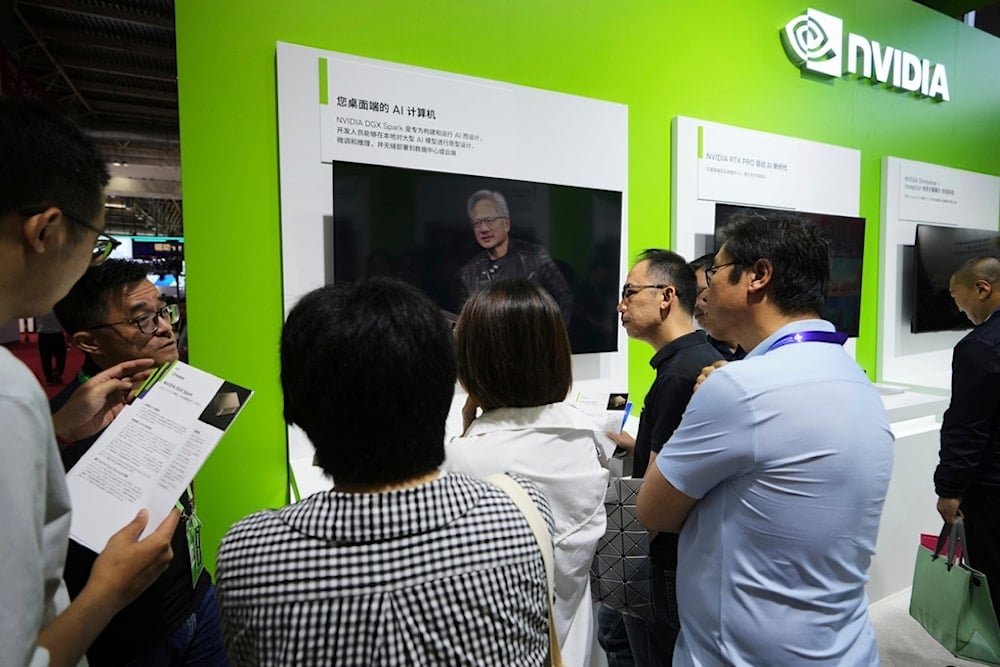Nvidia under scrutiny from China despite H20 chips US export approval
Nvidia faces Chinese resistance to its H20 chip sales, as Beijing tightens security reviews and pushes for self-sufficiency despite US export approvals.
-

An exhibitor introduces the Nvidia DGX Spark to visitors at the Nvidia exhibition booth during the 3rd China International Supply Chain Expo at the China International Exhibition Center, in Beijing, Thursday, July 17, 2025 (AP)
Nvidia’s return to the Chinese market has been met with resistance, just weeks after Washington allowed the chipmaker to resume sales of its H20 processors to China.
Bloomberg reported on Tuesday that Chinese regulators urged companies not to use Nvidia’s H20 chips or those from rival Advanced Micro Devices for government or national security projects. In a separate development, The Information said authorities had ordered leading technology firms, including ByteDance, Alibaba, and Tencent, to suspend purchases of Nvidia chips pending a national security review.
Nvidia defended the H20, stating it “is not a military product or for government infrastructure” and warning that restrictions would harm US technology leadership without offering security benefits.
The moves follow reports that Chinese officials had earlier summoned Nvidia over concerns that its chips might contain tracking functions or “backdoors”. Nvidia has strongly denied such allegations.
Trade tensions complicate market strategy
The scrutiny threatens Nvidia’s efforts to maintain market share in China, a critical market for its AI-focused chips. CEO Jensen Huang is navigating the company through rising US-China trade tensions as Washington pursues policies aimed at ensuring American dominance in advanced semiconductor technology.
The House and Senate are weighing legislation that would require chipmakers to add security mechanisms and location verification features to AI processors. Meanwhile, the Trump administration has framed its July decision to allow limited Nvidia exports as part of a broader strategy to keep Chinese AI reliant on US hardware. Trump has also floated a plan that would see Washington take a 15% cut of Nvidia’s China sales.
China doubles down on chip self-sufficiency
Analysts say Beijing’s moves highlight its determination to boost self-reliance in semiconductors. Since US export restrictions began in 2022, Chinese GPU makers have received state support to close the technology gap with Nvidia. Companies like Huawei are advancing their own chip designs but continue to face production limits.
“Beijing is signaling to its tech firms that they must continue to support Huawei’s AI development, even if Nvidia’s chips are better,” said Chris Miller, author of Chip War: The Fight for the World’s Most Critical Technology.
Reva Goujon of the Rhodium Group added that China is seeking to remove barriers to the adoption of domestic chips, despite the challenges posed by their lower performance. “Access to US technology can still be valuable, but Beijing wants to ensure the roadmap is still driving toward self-reliance,” she said.
Not a full ban... yet
Despite the warnings, analysts doubt Beijing will impose a long-term block on Nvidia’s H20 chips. “After the investigation is finished, I don’t think it has a strong rationale to actually block the H20s,” Bernstein senior analyst Qingyuan Lin told CNBC, though he noted delays could give Chinese firms more space to grow.
Industry watchers say Beijing’s actions may be intended less as a permanent rejection and more as a signal that the chips will be tightly monitored. In the meantime, demand for the H20 remains strong among Chinese AI developers, with Huawei struggling to keep up with local demand.
Meanwhile, Washington appears prepared to expand chip approvals beyond Nvidia and AMD. Trump also suggested he would permit Nvidia to sell a reduced-performance version of its latest Blackwell chip to China, underscoring the balancing act between economic opportunity and strategic control.
US restricts AI chip exports to China
While the H20 chip has received export approval, Nvidia's other advanced AI processors remain restricted from being shipped to China, as successive US administrations have continued to impose limitations on cutting-edge semiconductor exports to hinder Beijing's progress in artificial intelligence and military technology development.
As part of tightening US-China tech tensions, American lawmakers have proposed requiring Nvidia and other AI chipmakers to embed location tracking and remote-disable features into their products.
While the proposals are framed as safeguards against unauthorized use, Beijing views such measures as potential vectors for foreign surveillance and control, particularly when implemented in semiconductors destined for Chinese infrastructure or research facilities.
Although these restrictions have constrained US companies from fully capitalizing on China's surging demand as one of the world's biggest semiconductor markets, the Chinese market continues to serve as a significant source of revenue for American chip manufacturers.
Huang has warned that Nvidia's market leadership could weaken if it loses access to the Chinese market, where domestic developers are increasingly being targeted by Huawei Technologies, with its locally-produced chips, while the company reported in May that the H20 chip had generated $4.6 billion in first-quarter sales with China contributing 12.5% of its total revenue during that period.

 5 Min Read
5 Min Read










